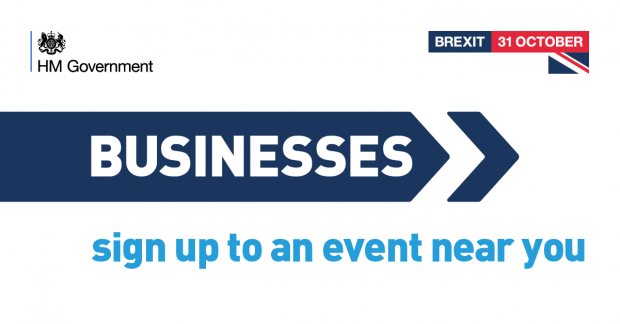The United Kingdom will leave the EU on the 31 October 2019 and businesses will need to take action to get ready.
Brexit and the insolvency regime
As Director of Strategy and Change at the Insolvency Service, I’ve taken a keen personal interest in making sure that our insolvency regime is ready for Brexit.
The UK government has made clear that it's in the interests of the UK and the EU that there continues to be an effective framework for resolving cross-border legal matters, including insolvency, after we leave.
I attended a conference of international insolvency regulators recently. Over 30 government insolvency departments from around the world met to discuss emerging issues, innovations and general best practice across a range of topics. There was a lot of interest in Brexit and what might happen afterwards!
It’s in everyone’s interests, small businesses and insolvency professionals included, to prepare as well as they can. To help you prepare, the Department of Business, Energy & Industrial Strategy is running a series of Brexit Business Readiness Events.
Brexit Business Readiness Events
The events are free and you can meet government advisers and to find out what actions your business needs to take to prepare.
The events will combine a keynote address, interactive support, advice stands and in-depth sessions led by subject matter experts. They will provide you with specific business-focused advice and help.
If you'd like to attend one of the events you can register now.
Events coming soon
Monday 21 October: Manchester
Monday 21 October: Reading
Tuesday 22 October: Middlesbrough
Tuesday 22 October: Stoke-on-Trent
Wednesday 23 October: Canterbury
Wednesday 23 October: Wolverhampton
Six things you can do to Get Ready for Brexit
With the UK leaving the EU on 31 October, there are six things small and medium-sized businesses can do now to get ready:
Make sure your employees' professional qualifications are recognised in the UK, European Economic Area (EEA) and Switzerland
Make sure your employees’ professional qualifications are recognised in countries they are doing business. EEA (EU and Iceland, Liechtenstein, Norway) or Swiss qualified professionals working in UK-regulated professions will need their qualifications recognised by the relevant UK regulator.
UK professionals working in the EEA or Switzerland will need their qualifications recognised by the relevant regulator in the country they want to work in. Check if you need to take action on gov.uk/brexit and search ‘providing services to the EU’.
Signpost the EU Settlement Scheme
Employers can help their EU, EEA and Swiss staff get the information they need to apply for status under the EU Settlement Scheme. This will enable them to secure their rights in the UK. Applicants have until at least 31 December 2020 to make an application. Visit gov.uk/brexit and search ‘EU Settlement Scheme Employer Toolkit’ for more information.
Act now to continue legally receiving personal data from EU/EEA after Brexit
Check how you can legally continue to receive personal data such as names, addresses or payroll details from organisations in the EU or EEA after 31 October. You may need to update your contracts or take other steps. An example of a personal data transfer from an EU/EEA partner is a UK company that receives customer information from an EU/EEA company, such as names and addresses of customers, suppliers or partners to provide goods or services.
Find additional information at gov.uk/brexit-personal-data or visit the Information Commissioner's Office (ICO) guidance at ico.org.uk and search for ‘data protection and Brexit’.
Check requirements to operate in EU member states
Check the regulations for EU/EEA countries to ensure you can still operate there, as UK businesses, service providers, employees and self-employed persons may face additional legal, regulatory and administrative barriers, including visas or work permits. Visit gov.uk/brexit and search ‘providing services to the EU’.
Prepare for new customs and VAT procedures at the border when trading with the EU
To continue importing from and exporting to the EU after 31 October there are changes you need to make now. Make sure you have an Economic Operators Registration and Identification (EORI) number that starts with GB, it’s quick, easy and free to do on gov.uk/brexit.
For businesses that import there’s also the option of applying to make this easier with transitional simplified procedures (TSP). This streamlines the process and is ideal for those new to customs procedures.
Find step-by-step guides to importing and exporting, as well as more information at gov.uk/brexit-traders.
Check whether any EU funding you receive will be guaranteed
The government has guaranteed that UK organisations will continue to receive funding over their projects’ lifetimes if they have successfully bid into EU-funded programmes up to the end of 2020. Payments can extend beyond 2020.
To find out about a specific fund, search gov.uk/brexit for ‘European and domestic funding after Brexit’.
Speak with your lawyer and accountant, or visit gov.uk/brexit for tailored business information or to sign up for email updates to help you Get Ready for Brexit.

Leave a comment